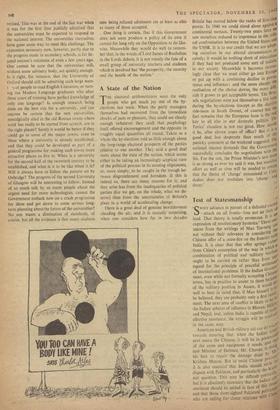A State of the Nation
-rue electoral arithmeticians were the only I people who got much joy out of the by- elections last week. When the party managers themselves had recovered from the immediate shocks of pain or pleasure, they could see clearly enough (whatever they said) that psephology itself offered encouragement and the opposite in roughly equal quantities all round. Taken as a whole the by-elections told us little enough about the long-range electoral prospects of the parties relative to one another. They said a good deal more about the state of the nation, which seems either to be taking an increasingly sceptical view of the political process in its existing alignments, or, more simply, to be caught in the trough be- tween disgruntlement and boredom. If this is indeed so, there are many reasons for it; and they arise less from the inadequacies of political parties (for we get, on the whole, what we de- serve) than from the uncertainties of Britain's place in a world of accelerating change.
There is a great deal of genuine bewilderment clouding the air; and it is scarcely surprising, when one considers how far in two decades Britain has moved below the ranks of first-class power. In 1940 we could stand alone against continental menace. Twenty-two years later we saw ourselves reduced to impotence in the crib: cal confrontation between the United States and the USSR. It is to our credit that we are adapt- ing ourselves to our altered circumstances s° calmly; it would be nothing short of miraculous if they had not produced some sort of malaise in our society. Meanwhile it becomes increas. ingly clear that we must either go into Drone or put up with a continuing decline in power' status and influence: and the more sharplY the realisation of the choice dawns, the more Jaw cult it grows to get acceptable terms. The Wi? sels negotiations were not themselves a live IS'Sue during the by-elections (except as the decislv side-issue in South Dorset, of course) but lh fact remains that the European issue is the read key to all else in our domestic politics. The Tories' situation is not too good. How should it be, after eleven years of office? But it IS 3 good deal less desperate than much of the panicky comment at the weekend suggested. F national interest demands that the Government successfully concludes the negotiations with alg Six. For the rest, the Prime Minister's new tear! is as strong as ever we said it was, but manifest, effort as well as time will be needed to cnsurCI that the theme of 'change' announced at "113; dudno does not modulate into 'change al!" decay.'






































 Previous page
Previous page